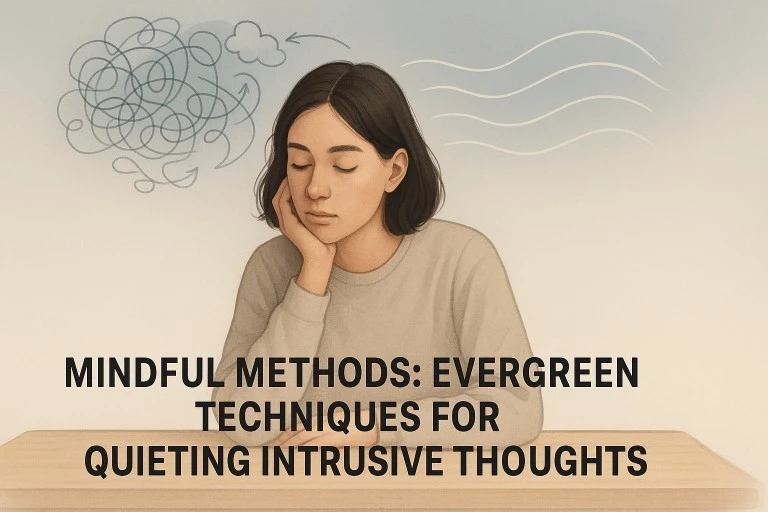
- October 30, 2025
Mindful Methods: Evergreen Techniques for Quieting Intrusive Thoughts
Every day, individuals around the world face the challenge of dealing with intrusive thoughts. These thoughts can be distressing and unwanted, but it’s important to realize that they are both common and treatable. This blog will explore the nature of intrusive thoughts, their causes, types, and outline effective coping strategies and treatment options.
What Are Intrusive Thoughts?
Intrusive thoughts are unwanted, distressing, and often repetitive mental images or ideas that can disturb an individual. They commonly involve themes of harm, taboo subjects, or fears and doubts, like “what if” scenarios regarding safety or morality. It is crucial to differentiate between normal worries and intrusive thoughts, as the latter tend to be disruptive and persistent.
Examples of Intrusive Thoughts
- Violent images or thoughts
- Sexual thoughts
- Religious blasphemy
- Fear of acting impulsively
- “What if” doubts about safety, morality, or decisions
It’s important to clarify: having these thoughts does not mean the individual wants to act on them.
One Conversation Can Change Everything! Consult Dr. Neha Khurana for personalized care for intrusive thoughts
Are Intrusive Thoughts Normal?
Yes, intrusive thoughts are normal and experienced by most people at various times. However, they can become clinically significant when they are persistent and cause distress or interfere with daily life. This may happen to individuals even without a diagnosed mental health condition.
What Causes Intrusive Thoughts?
Intrusive thoughts can be triggered by anxiety, stress, or trauma. They are often associated with mental health disorders like Obsessive-Compulsive Disorder (OCD), Post-Traumatic Stress Disorder (PTSD), or depression. Neurobiological factors and cognitive distortions also play a significant role.
Intrusive Thoughts and OCD
In OCD, intrusive thoughts often come in the form of obsessions, leading to compulsions such as reassurance seeking or avoidance. Different OCD subtypes include harm OCD, relationship OCD, and contamination OCD, dealing with corresponding themes.
How to Stop Intrusive Thoughts: Practical Strategies
Mindfulness & Acceptance
Practices such as mindfulness meditation help you acknowledge and observe thoughts without reacting. This non-reactiveness is a core aspect of accepting and diminishing the power of intrusive thoughts.
Cognitive Behavioral Therapy (CBT)
CBT helps in identifying and challenging distorted thoughts, promoting healthier thinking patterns.
Exposure and Response Prevention (ERP)
Especially effective for OCD, ERP involves facing feared thoughts without resorting to compulsive rituals.
Journaling & Thought Labeling
Journaling offers a strategic outlet to explore and reframe thoughts, whereas thought labeling assists in cognitive restructuring.
Avoiding suppression is crucial as fighting thoughts typically backfires.
One Conversation Can Change Everything! Consult Dr. Neha Khurana for personalized care for intrusive thoughts
Medication for Intrusive Thoughts
Selective Serotonin Reuptake Inhibitors (SSRIs) are commonly prescribed for managing OCD and intrusive thoughts. The right medication, as guided by a medical professional, can help significantly and results may start to manifest after several weeks.
When to Seek Help
If intrusive thoughts cause extreme distress or impairment, it might be time to seek professional help. Therapists, psychiatrists, and treatment centers specialize in managing such conditions effectively.
Living With and Managing Intrusive Thoughts Long-Term
Building a supportive routine incorporating mindfulness practices, limiting triggers, and joining support groups are effective long-term management strategies. Practicing self-compassion is equally important.
Conclusion
Intrusive thoughts can be overwhelming but understanding and effective treatment options make a huge difference. Remember, you don’t need to face them alone—professional help is available and can provide the support you need.
People Also Ask
Are intrusive thoughts normal?
Yes. Almost everyone experiences intrusive thoughts occasionally. They only become a concern when they’re frequent, distressing, or interfere with daily life.
What are intrusive thoughts?
Intrusive thoughts are unwanted, involuntary ideas, images, or urges that pop into your mind and cause discomfort. They often conflict with your values and are hard to control.
What causes intrusive thoughts?
They can stem from stress, anxiety, trauma, or mental health conditions like OCD, PTSD, or depression. Hormonal changes and cognitive patterns may also contribute.
Are intrusive thoughts true?
No. Intrusive thoughts don’t reflect your true desires or intentions. They’re unwanted mental events that don’t define who you are.
Is it normal to have violent thoughts?
Yes, occasional violent or disturbing thoughts are normal and don’t mean you’ll act on them. Seek help if they become persistent or cause significant distress.
What are some examples of intrusive thoughts?
Common types include violent, sexual, religious, relationship, contamination, or moral doubts — often revolving around “what if” scenarios.
When should I seek help for intrusive thoughts?
If they’re constant, distressing, or lead to compulsive behaviors, avoidance, or anxiety, it’s best to consult a therapist or psychiatrist.
What’s the difference between intrusive and impulsive thoughts?
Intrusive thoughts are unwanted and cause distress, while impulsive thoughts are sudden urges you might feel inclined to act on.
